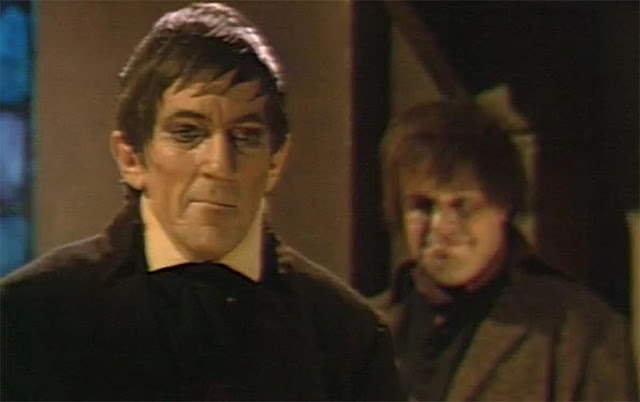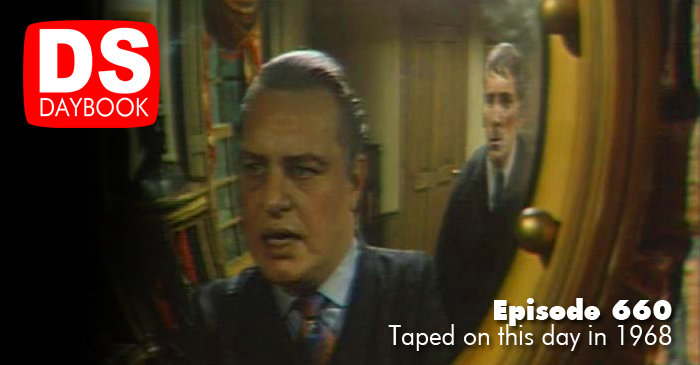Taped on this date in 1969: Episode 665
By PATRICK McCRAY
Everything’s at stake when Barnabas ends his trip to 1795 by saying goodbye to Vicki… and hello to sending Angelique back to Hell in a fiery flambe of just desserts. Barnabas Collins: Jonathan Frid. (Repeat; 30 min.)
Angelique gloats that Vicki will be revived from torpor only to awaken in a coffin, unable to escape. Barnabas, hearing of this, wryly retorts by having a torch-wielding Ben burn her alive. Barnabas then sees Vicki off to her future with Peter Bradford, at peace, happy that she is simply alive. Unable to will himself back to 1968, Barnabas reasons that he must return to the 20th century the way he reached it the first time, in his coffin. As he starts his descent into suspended animation and ensures his coffinback and tray table are in their full, upright position while his carrion luggage is stowed under the sepulcher in front of him, Nathan Forbes seemingly stakes him.
The challenge with Dark Shadows — on both sides of the screen — was and is monotony. Soap operas fill the most hours possible with the least amount of story that they can. People may only tune in once a week. Certainly, the key demographic, housewives, were taxed with myriad distractions throughout the day. In many ways, it is “anti-storytelling.“ The virtue here is not economy nor even detail, but the believability that comes with intense, regular familiarity. That’s what makes them feel so strangely realistic. But sometimes even soap operas have to abandon that tidal rhythm and begrudgingly let one world end and another world begin.
Welcome to Terra Nova. Dark Shadows has six milestone moments that define its arc, and this is the third, marking the middle of the series in both its episode run and emotional journey. Of course, they return to 1795 for it. This is, figuratively, where it all began. There is more going on in this 24 minutes of television than in 24 entire episodes of the average show. And that’s because, perhaps, there isn’t. That’s what you get when you finally enjoy the payoff for nearly 450 episodes, giving Barnabas about as much cathartic satisfaction and growth as he’s going to be allowed.
It’s an invitation to appreciate the five-act structure of the series. If everything before Barnabas is Act One, then this ends Act Two. 665 bookends a story that conceptually begins in 1795 for both Vicky and Barnabas. It ends there, as well. If the two characters are strange mirrors of each other, orphans out of their native eras, the most crucial parts of their lives begin and end in the overlap: 1795. Twice, at least.
The first act of Dark Shadows introduces Victoria. The second introduces Barnabas and focuses on their interaction, with 1795 as a fulcrum for both of them. For him, the arc actually begins with her first trip to 1795. It also ends in the most appropriate yet unlikely of places: in her second trip to 1795. (During his second journey there, as well.) After Vicky finally departs with Peter Bradford (to no doubt die of dysentery on the western frontier, which was probably New Hampshire), we look at the other unstuck time traveler, Barnabas, perhaps to see what kind of humanizing effect she had on him. He once again has to say goodbye to a woman he ostensibly loves, but this time, it is willingly. That is a Brobdingnagian leap for a man from his era. Few have suffered as much as he has in the pursuit of love, and his newfound sense of easy confidence evidences one of his greatest transformations.
Although fate again thrusts him to 1795, Barnabas begins the conclusion of Act Three in 1897. It’s as if he keeps returning for a reset, like some sort of perverse variation on Groundhog Day. With differences. In 665, he returns to his point of origin to demonstrate emotional mastery. At the end of 1897, he returns to see that he is the master of nothing. Forces far larger than he make a mockery, and perhaps even a Macarena, of his well-earned autonomy. And why does this happen? Why is it important? Is it to ridicule what he has accomplished? Perhaps. But perhaps some of it alleviates him of responsibility. Yes, absolutely, he is captain of his own ship and master of his own maturity. Yeah, yeah we get it. And that’s just ducky. However, too much reliance on that mentality can lead to total devastation… if forces genuinely beyond your control have conflicting plans. That takes us into Act Four, where Barnabas becomes even more of a storm-tossed ship, first as a Lambchop-tic puppet, composed of a sock seemingly worn by the robust actor William Conrad over a week in August. It concludes in Gerard’s Siege of Collinwood in 1970, demonstrating to Barnabas that while he may have control of himself, he has no control beyond. So, 1840’s Act Five is a chance to reconcile self-control while accepting that it has human limits. What’s left? The necessity of trust. He chooses to trust Angelique as much as he trusts Julia and overcoming his most tragic flaw— a resistance to forgive. Primarily, himself. Of course, forgiveness is easy to muster when you and the other person have hundreds of years to evolve after the inciting incident. His reward? Angelique, shot and killed. And, you know, that’s a thing. I think we can all admit it. And she is shot by a Trask, seeking revenge for the death of a father he didn’t even know. This proves that carrying a grudge, at some point, is more of a hobby than a righteous cause. That’s what it was for Barnabas. It’s certainly what it had become for Angelique, and it’s over the course of the 1840 storyline that we see her realize it, and give it up.
And that’s the story of Dark Shadows.
Episode 665 shows Angelique at the opposite end of her own forgiveness spectrum. We can buy a certain amount of infuriated jealousy. But at this point, Josette is dead. So, that’s out-of-the-way. Cross that one off the to-do list. Naomi is dead. Nathan Forbes is finally in a dance belt. You know, everyone is pretty miserable. So, you would think that Angelique’s work is done. But, like Sammy topping music with trick shooting and celebrity impressions at the Coconut Grove, she has to murder Vicki. Twice. Hanging, of course, because, you know, tradition. And then she has to plan on reviving her inside a coffin to die all over again. Why? I guess because Barnabas loves the gal or something. But the fact that Vicki’s running off with Roger Davis should be punishment enough for Barnabas. It’s not like he has a shot. No, here, she is drunk on evil to an extent that would have shamed Herbert Lom in a later Cluseau movie.
Perhaps Angelique has to be that evil, mechanically, because they want to reverse engineer this whole thing to justify the incredible, Fantasy Island moment when Barnabas opens the door so that Ben Stokes, who’s been waiting with a torch for Christ-knows-how-long, can light her up. It’s a great moment. Despite our love for Angelique, there’s nevertheless something satisfying in it.
Because we know she’ll be back. She’s just gonna go to Hell for a little while and then show up in 1897… with a considerably improved attitude I might add. They all know this by now. I mean, I’m surprised that Barnabas didn’t pack a lunch for her, like Charley’s wife handing him a sandwich on her endless MTA iniquity. It’s not really an execution. It’s just calling the Uber a little early.
That moment, and the sentimental moments between Barnabas and Ben later on, are necessary reminders about this hero. We met him as a lone agent out-of-time, defined by the friends who can never truly understand him. As unflagging as Julia and Willie are, they are constant reminders that he is not home. Not really. In 665, we are warmed and saddened to learn why. There is something truly grounding about this stranger, normally stranded in a strange land, in the company of his best friend. Someone that no one in the 20th century, save Vicki, knows. It puts his character into context and it puts his heroism into context and it puts his loneliness into context.
And maybe that’s ultimately why 1795 is such a nexus. Ben Stokes. As life becomes increasingly monstrous, Ben rises to the challenge with ever-greater humanity. He’s both a servant, like Vicki and an occasionally ruthless man-of-action — with a heart the size of Canada — like Barnabas.
Maybe 1795 isn’t home. Maybe Collinwood and the Old house are not Home. Maybe Ben Stokes is home.
Seen like that, I understand why Barnabas feels so alone without him.
This episode was broadcast Jan. 10, 1969.



